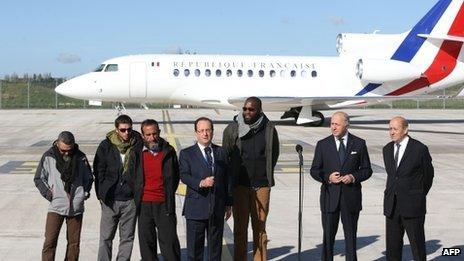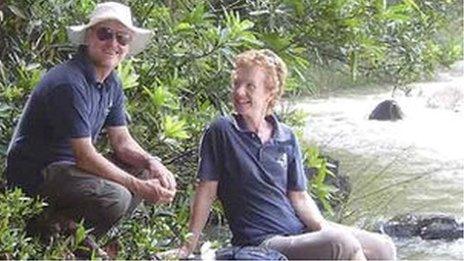Kidnap ransoms 'fuelling terrorism' - UK Foreign Office
- Published

It was widely speculated that a ransom was paid for the releases of these French hostages in Niger in October
The UK Foreign Office has warned that ransom payments made to kidnappers are directly fuelling terrorism, and that the problem is getting worse.
The G8 countries agreed, at a summit in June, not to pay ransoms to kidnappers, but in practice the agreement does not appear to be holding.
Six weeks before this summer's terror alert that closed US and UK embassies in Yemen and elsewhere, al-Qaeda's franchise there took delivery of a $22m (£13.46m) in cash in exchange for Swiss, Austrian and Finnish hostages.
The money was allegedly delivered by intermediaries from a nearby Gulf Arab country.
"Basically the money is taken and divided into several categories for several departments," says terrorism expert Aimen Deen, from security consultants Five Dimensions.
"There is the weapons department. There are the training camps that need food and electricity. They need money for weapons for training, they need to obtain chemicals for explosives, they need to pay for the tickets for people to travel... the renting of apartments abroad and the building of camps outside and inside of Yemen."
Senior Foreign and Commonwealth Office (FCO) officials estimate that more than $60m has been paid in terrorist ransoms in the last five years. They say terrorist kidnappings are on the rise in Syria, Yemen, Nigeria and NW Africa.
They believe the number of groups doing it is up and so is the going rate - from $4m per hostage in the Sahara in 2010, to well over $5m today.
They point to recent events in Mali as the clearest illustration yet.
This year's fighting there followed last year's near-takeover of the whole country by al-Qaeda in the Islamic Maghreb (AQIM) - an al-Qaeda franchise grown rich on ransoms paid for Spanish, Swiss and Italian hostages.
When French forces entered caves abandoned by jihadist fighters in the north of Mali, they found a letter from the regional al-Qaeda commander Abdulmalik Droukdal to his counterpart in Yemen, in which he declared that "most of the battle costs were met by spoil from the hostages".
Pointing the finger
European governments never admit to paying ransoms - they are usually arranged through intermediaries - so I asked Aimen Deen: where was the proof?
"I sat with a pilot of a small Cessna [aircraft] who said that the Spanish government handed him over 12m euros in cash in black bags" says Deen.
"He was ordered to go to a specific oasis over Mali with the co-ordinates and drop the bags over the oasis. So that's confirmed to me by a Dutch diplomat who confirmed his colleagues told him exactly the same thing."

The brother of Rachel Chandler (right) said he was presented with no alternative other than to give her kidnappers the ransom they wanted
Ever since the 1970s, the British government has had a policy of not making any substantive concessions to kidnappers, maintaining that it only encourages more hostage-taking.
FCO officials say they are not looking to point the blame at specific countries, although they are clearly frustrated. Rather, they want to flag up awareness of what happens when terrorists get their hands on large ransoms.
But Alexander Hitchens, a lecturer in war studies at Kings College London, had no such hesitation in naming which European governments he believes have secretly been paying off the kidnappers.
"In the past the German government has been criticised for being the first to do this in the early 2000s," says Hitchens.
"But really, most recently it's been the French and Spanish and Italian governments. [In October] four French hostages were released from Niger - AQIM hostages - who, it's strongly believed, were released to perhaps a $20m payment."
Getting rich
The French government insists that no public money was paid for their release, but Hitchens says the company employing them would have come up with the cash with the tacit approval of the French government.
Western governments are all too aware of how unpopular it is domestically to have their citizens paraded on hostage videos on the internet with a gun to their heads, and few have the stomach to tough it out.
Yet, in June, all the G8 governments made a commitment at the summit not to pay terrorist ransoms.
Privately though, diplomats and security consultants fear this is not always being honoured in practice.
When someone is kidnapped, whether by terrorists or bandits, it causes untold anguish to their relatives back home.
Rachel Chandler and her husband Paul were seized off the Seychelles four years ago, by Somali gunmen.
The kidnappers were pirates, not terrorists, but Mrs Chandler's brother Stephen Collett still had to negotiate a substantial ransom for their release.
He says that initial offers of help from the Foreign Office and the Metropolitan Police melted away once it became clear the only way he could get the Chandlers out of Somalia was by paying up.
"I'm very unhappy at paying ransoms," says Collett. "But if we have a policy where there is no alternative, and the Foreign Office don't give you an alternative, they just seem to think if you just sit back and do nothing, eventually they might be released."
British diplomats did try to negotiate a release through tribal elders but in the end, Stephen Collett had to pay.
Because the money went to common criminals, not terrorists, it was not illegal.
But this warning by the Foreign Office is stark. It says terrorist groups are getting rich from Western hostage ransoms so they will carry on kidnapping and continue to carry out atrocities, financed by European money.
- Published1 November 2013
- Published30 October 2013